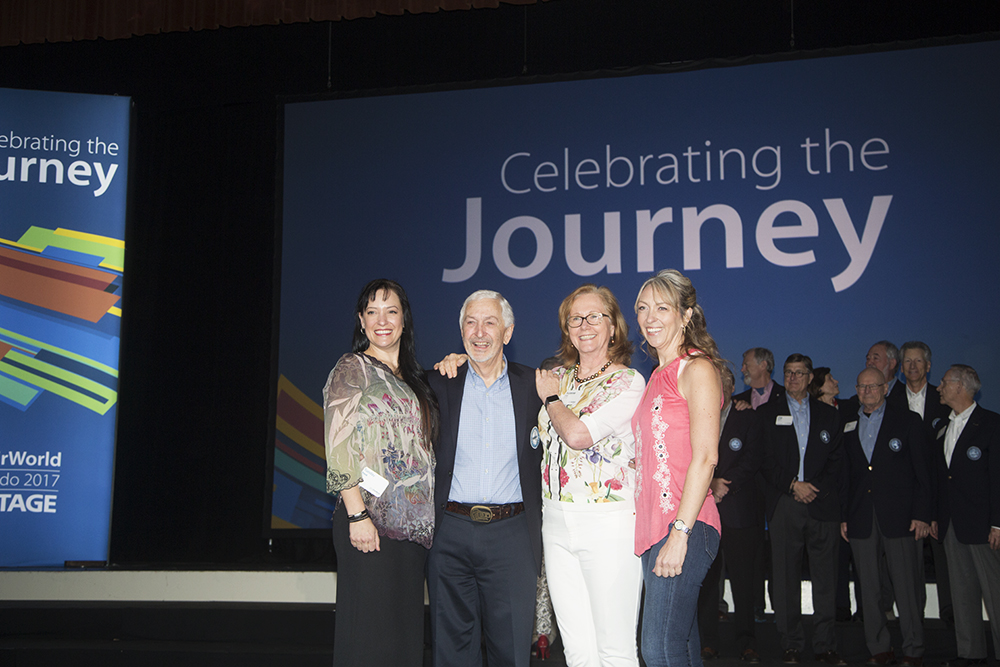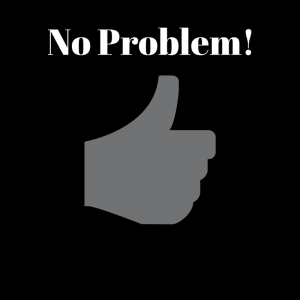This announcement was written by Vistage International:
Each year the Don Cope Award is presented to an individual who has made one of the greatest, lasting contributions to the Vistage mission and values. The award symbolizes service, selflessness, and commitment.
Our 2016 Cope Award winner Dwight Frindt, embodies each of these qualities. He coaches, listens, mentors, and facilitates from the premise: “How can I make others better, by first bettering myself?”
Dwight began his journey with Vistage in May of 1994, and his passion, dedication, and enthusiasm have never wavered. He is a repeated winner of Master Chair and Chair Excellence awards, is current BPC for three regions in three states, is Chair of a CE group and a Key group; and somehow still finds time for philanthropy. (Investing 25% of his net worth in the Hunger Project, a nonprofit he first joined as a volunteer 40 years ago.)
Dwight strives to help each and every member of the Vistage community be full participant in their own life, unleashing their authentic potential; so they may in turn have that impact on their own team.
We reached out to Dwight’s members, for perspective on the impact he has had on their lives. One of his members said, “He truly knows how to help. Most importantly, he helps you learn how to help yourself.”
Could a sentiment more precisely embody the essence of the Don Cope Award?
Trust. Caring. Challenge. And growth. That is what Don Cope stood for. He is remembered for freely helping those in need, and freely giving of his time and energy. Dwight Frindt, stands with him.
Congratulations to Dwight Frindt, the 2016 Cope Award Winner!









 To move into a New Year powerfully and to create the results you want there are some key steps to take. The first is creating an “elegant ending” to the past. Last week we posted about “
To move into a New Year powerfully and to create the results you want there are some key steps to take. The first is creating an “elegant ending” to the past. Last week we posted about “ It’s the time of year when many of us conduct annual rituals that may include everything from strategic planning sessions for business to making New Year’s resolutions or setting Bold Goals for 2016 and beyond. We’ve found any such process to be much harder to do when we haven’t completed and let go of the past. It’s very difficult, (impossible?), to really move forward when we are carting the past along with us. The process of letting go can include changing your attitude and perceptions about what the economy did to you, to digging very deep and letting go of some of the childhood stuff that shapes your life.
On the fun end of the spectrum, we have for many years put flip chart paper all over our walls when we have a New Year’s Eve party with a simple question on each, such as “What did I start and not complete?” or “What did I accomplish that I haven’t been acknowledged for?” or “What did I screw up that I didn’t get caught for?” Guests write on the charts all evening with colored markers and sometimes get even more creative with a touch of artistic display as well. On a number of occasions, we have taken them all down at midnight and symbolically burned them.
It’s the time of year when many of us conduct annual rituals that may include everything from strategic planning sessions for business to making New Year’s resolutions or setting Bold Goals for 2016 and beyond. We’ve found any such process to be much harder to do when we haven’t completed and let go of the past. It’s very difficult, (impossible?), to really move forward when we are carting the past along with us. The process of letting go can include changing your attitude and perceptions about what the economy did to you, to digging very deep and letting go of some of the childhood stuff that shapes your life.
On the fun end of the spectrum, we have for many years put flip chart paper all over our walls when we have a New Year’s Eve party with a simple question on each, such as “What did I start and not complete?” or “What did I accomplish that I haven’t been acknowledged for?” or “What did I screw up that I didn’t get caught for?” Guests write on the charts all evening with colored markers and sometimes get even more creative with a touch of artistic display as well. On a number of occasions, we have taken them all down at midnight and symbolically burned them. We all have ways of describing our businesses. It usually involves a description of our services and products, and how they are delivered summarized in a snappy “elevator speech.” But these finely crafted and well-rehearsed statements are often a “red herring” in many ways and we get caught up in details instead of seeing the true bottom line of what we do.
I was reminded of this when I read Google’s announcement of the formation of a new umbrella parent company called, “Alphabet.” What struck me was the line from one of the founders stating, “Sergey and I are seriously in the business of starting new things.” This is the bottom line of what Google’s founders have to say about what business they are in. They start new things. Tony Hsieh made a similar statement several years ago about Zappo’s, (and I am paraphrasing), “we are a customer service company.” It seems to me to be particularly powerful and important to see your business in such a deceptively simple way and also to be able to articulate it so clearly.
We all have ways of describing our businesses. It usually involves a description of our services and products, and how they are delivered summarized in a snappy “elevator speech.” But these finely crafted and well-rehearsed statements are often a “red herring” in many ways and we get caught up in details instead of seeing the true bottom line of what we do.
I was reminded of this when I read Google’s announcement of the formation of a new umbrella parent company called, “Alphabet.” What struck me was the line from one of the founders stating, “Sergey and I are seriously in the business of starting new things.” This is the bottom line of what Google’s founders have to say about what business they are in. They start new things. Tony Hsieh made a similar statement several years ago about Zappo’s, (and I am paraphrasing), “we are a customer service company.” It seems to me to be particularly powerful and important to see your business in such a deceptively simple way and also to be able to articulate it so clearly. It happens instantly, automatically, and from an unexamined place in your mind. It shows up in a sudden shift from open, happy, creative, and conversational to defensive, and, depending on your typical reaction, engaged in some form of fight, flight, freeze, or appease. I have heard it called by a number of terms. For me, nothing says it more directly than the “kill switch” that instantly cuts off your aliveness and puts you into survival behavior.
Apparently all human beings have a kill switch. It gets set off by all kinds of circumstances and interactions. The common thread is an unwitting reminder of what you believe to be wrong with you. It not only reminds you, the "incoming" matches the story you have been telling yourself most all of your life and serves to confirm your limiting belief. At the level of your limbic system (old brain), it occurs as a threat to your survival. Since the limbic system can't tell the difference between a physical threat and a threat in language, the event has the same impact on your body chemistry and aliveness.
It happens instantly, automatically, and from an unexamined place in your mind. It shows up in a sudden shift from open, happy, creative, and conversational to defensive, and, depending on your typical reaction, engaged in some form of fight, flight, freeze, or appease. I have heard it called by a number of terms. For me, nothing says it more directly than the “kill switch” that instantly cuts off your aliveness and puts you into survival behavior.
Apparently all human beings have a kill switch. It gets set off by all kinds of circumstances and interactions. The common thread is an unwitting reminder of what you believe to be wrong with you. It not only reminds you, the "incoming" matches the story you have been telling yourself most all of your life and serves to confirm your limiting belief. At the level of your limbic system (old brain), it occurs as a threat to your survival. Since the limbic system can't tell the difference between a physical threat and a threat in language, the event has the same impact on your body chemistry and aliveness. There is a paradox about leadership regarding your customers and potential customers and here it is. The longer you are a leader in your business and industry the more of an expert you will be seen to be. Simultaneously, you may also completely lose touch with what it is to be a new customer to your product or service, what those potential customers are really wanting to buy, and how your customer service occurs for both your existing and potential customers. It doesn’t take long to be immersed in your own marketing and sales belief system and lose touch with the expertise that allowed your original success. If you succumb to this very normal pattern, you will lose insight into something critical to your success and sustainability and you will become an expert/non-expert. This is the “ivory tower of leadership,” or at least one of them. You will have hard-won expertise in knowing your product or service, your competitors, and your existing customers, but you will likely lose understanding critical desires and behaviors about those who are not buying from you - your potential new customers.
A great example of this occurs in my industry. Within the industry, people talk about “peer advisory.” Do you think there is a potential customer out there who has ever heard of “peer advisory” or has a clue what that means? I can say fairly definitely that the answer is “no” unless they have been approached by someone in the industry who explained it to them. It’s important that those in my industry understand how people who need these services talk about it, not how we inside the industry talk about it.
There is a paradox about leadership regarding your customers and potential customers and here it is. The longer you are a leader in your business and industry the more of an expert you will be seen to be. Simultaneously, you may also completely lose touch with what it is to be a new customer to your product or service, what those potential customers are really wanting to buy, and how your customer service occurs for both your existing and potential customers. It doesn’t take long to be immersed in your own marketing and sales belief system and lose touch with the expertise that allowed your original success. If you succumb to this very normal pattern, you will lose insight into something critical to your success and sustainability and you will become an expert/non-expert. This is the “ivory tower of leadership,” or at least one of them. You will have hard-won expertise in knowing your product or service, your competitors, and your existing customers, but you will likely lose understanding critical desires and behaviors about those who are not buying from you - your potential new customers.
A great example of this occurs in my industry. Within the industry, people talk about “peer advisory.” Do you think there is a potential customer out there who has ever heard of “peer advisory” or has a clue what that means? I can say fairly definitely that the answer is “no” unless they have been approached by someone in the industry who explained it to them. It’s important that those in my industry understand how people who need these services talk about it, not how we inside the industry talk about it. l business leader, you are probably smart, have a strong point-of-view on most things, and you communicate in a way that has others follow you. Whether realized or not, you may expect yourself to have an opinion on most all of the issues that arise in your organization and you likely believe that your responses are correct. In fact, you may not even recognize them as your beliefs or as your own point-of-view. Maybe it's just "reality," after all, you have been successful, right?
Also as a successful leader, you have hired team members that you believe are intelligent, qualified and talented people. You have also hired vendors and outside partners that you also believe are talented, intelligent and reliable. So, the question is "how well and how often do you actually listen to these people?"
l business leader, you are probably smart, have a strong point-of-view on most things, and you communicate in a way that has others follow you. Whether realized or not, you may expect yourself to have an opinion on most all of the issues that arise in your organization and you likely believe that your responses are correct. In fact, you may not even recognize them as your beliefs or as your own point-of-view. Maybe it's just "reality," after all, you have been successful, right?
Also as a successful leader, you have hired team members that you believe are intelligent, qualified and talented people. You have also hired vendors and outside partners that you also believe are talented, intelligent and reliable. So, the question is "how well and how often do you actually listen to these people?" Recently I have noticed a trend in business communication. It’s the automatic response of, “no problem.” I have heard it from customer service agents, business bankers, computer/IT people and more. It happens in response to inquiries, questions, issues and just about any topic where one needs to communicate with someone else for mutual understanding. It seems to be the widespread and currently fashionable answer to provide to customers, clients, and colleagues.
While intended to make someone feel soothed and assured that whatever is going on is “under control” and will be addressed, corrected, etc. I find myself having the opposite reaction. I have noticed I often feel “cut off” in these conversations with the “no problem,” before I have even expressed what I have to say. I also notice that the “no problem” is usually repeated multiple times in rapid succession and seems to be a quick offensive to deflect whatever I might be about to say next. This only increases my annoyance.
Recently I have noticed a trend in business communication. It’s the automatic response of, “no problem.” I have heard it from customer service agents, business bankers, computer/IT people and more. It happens in response to inquiries, questions, issues and just about any topic where one needs to communicate with someone else for mutual understanding. It seems to be the widespread and currently fashionable answer to provide to customers, clients, and colleagues.
While intended to make someone feel soothed and assured that whatever is going on is “under control” and will be addressed, corrected, etc. I find myself having the opposite reaction. I have noticed I often feel “cut off” in these conversations with the “no problem,” before I have even expressed what I have to say. I also notice that the “no problem” is usually repeated multiple times in rapid succession and seems to be a quick offensive to deflect whatever I might be about to say next. This only increases my annoyance. Do you ever wish you could just be you, be yourself? Do you also struggle for balance in your life? One of my fellow Vistage Chairs recently used the term "relief from posing" in a conversation about one of the benefits members of Vistage Groups experience. I was immediately struck by how she captured an observation I have made about
Do you ever wish you could just be you, be yourself? Do you also struggle for balance in your life? One of my fellow Vistage Chairs recently used the term "relief from posing" in a conversation about one of the benefits members of Vistage Groups experience. I was immediately struck by how she captured an observation I have made about  The Seahawks’ season was tough. During the first half, things did not go well for a variety of reasons. The team pulled it together and the second half of the season was very strong. During the NFC Conference Championship the rubber met the road. Although they won, it wasn’t pretty and serious injuries occurred. In the Super Bowl, despite nearly winning, they suffered a painful loss in the final minutes of the game.
Although they lost, they are the first team in years with back-to-back Super Bowl appearances and overall they had an amazing season. They are also leading an utterly devoted legion of fans, the 12s, or “Seahawk Nation,” who did not turn on them because of their loss. Instead they have strongly embraced them. Clearly something special is going on here, particularly with the leadership of the Seahawks. Here are just some of the key lessons I see that you, and really all business leaders, could benefit from:
The Seahawks’ season was tough. During the first half, things did not go well for a variety of reasons. The team pulled it together and the second half of the season was very strong. During the NFC Conference Championship the rubber met the road. Although they won, it wasn’t pretty and serious injuries occurred. In the Super Bowl, despite nearly winning, they suffered a painful loss in the final minutes of the game.
Although they lost, they are the first team in years with back-to-back Super Bowl appearances and overall they had an amazing season. They are also leading an utterly devoted legion of fans, the 12s, or “Seahawk Nation,” who did not turn on them because of their loss. Instead they have strongly embraced them. Clearly something special is going on here, particularly with the leadership of the Seahawks. Here are just some of the key lessons I see that you, and really all business leaders, could benefit from: Recently I noticed two key themes that together have important applications to business leadership. The first was the Seattle Seahawks Coach, Pete Carroll's admonition to his team all season, "It doesn't matter how you start. It's how you finish!" The powerful demonstration of the value of his challenge was displayed in the NFL Championship game where his team came from a 16 point deficit in the last two minutes to a win and thereby qualify for the Super Bowl.
The second was a mantra repeated by Navy Seal Chris Kyle in the movie American Sniper, "Aim small to hit small." The clarity this provided him allowed him to become the most successful sniper in American history. Without engaging in an argument about his role and job, let's ask how does this mantra translate to business? Focus narrowly to get specific desired results.
Recently I noticed two key themes that together have important applications to business leadership. The first was the Seattle Seahawks Coach, Pete Carroll's admonition to his team all season, "It doesn't matter how you start. It's how you finish!" The powerful demonstration of the value of his challenge was displayed in the NFL Championship game where his team came from a 16 point deficit in the last two minutes to a win and thereby qualify for the Super Bowl.
The second was a mantra repeated by Navy Seal Chris Kyle in the movie American Sniper, "Aim small to hit small." The clarity this provided him allowed him to become the most successful sniper in American history. Without engaging in an argument about his role and job, let's ask how does this mantra translate to business? Focus narrowly to get specific desired results. Recently, I have encountered a number of executives who are working extremely hard, yet seem listless, and lacking passion. When I investigate, I find they are allowing themselves to be defined by their task agendas. They grin when I ask them if they've lost their mojo, but it is the grin of someone who just got caught in a little white lie rather than a grin of joy.
The conversation immediately turns to "shoulds", "oughtas," and "need tos." Highest on that list are things like get more sleep, eat better, cut down on the wine, and exercise more, none of which are likely to happen given their mental state. The lack of changed behavior gets blamed on the holidays, quickly followed by "I'll get right on it after the first of the year,” yet not much has changed.
Recently, I have encountered a number of executives who are working extremely hard, yet seem listless, and lacking passion. When I investigate, I find they are allowing themselves to be defined by their task agendas. They grin when I ask them if they've lost their mojo, but it is the grin of someone who just got caught in a little white lie rather than a grin of joy.
The conversation immediately turns to "shoulds", "oughtas," and "need tos." Highest on that list are things like get more sleep, eat better, cut down on the wine, and exercise more, none of which are likely to happen given their mental state. The lack of changed behavior gets blamed on the holidays, quickly followed by "I'll get right on it after the first of the year,” yet not much has changed. To move into a New Year powerfully and to create the results you want there are some key steps to take. The first is creating an “elegant ending” to the past. Last week we posted about “
To move into a New Year powerfully and to create the results you want there are some key steps to take. The first is creating an “elegant ending” to the past. Last week we posted about “ It’s the time of year when many of us conduct annual rituals that may include everything from strategic planning sessions for business to making New Year’s resolutions or setting Bold Goals for 2015 and beyond. We’ve found any such process to be much harder to do when we haven’t completed and let go of the past. It’s very difficult, (impossible?), to really move forward when we are carting the past along with us. The process of letting go can include changing your attitude and perceptions about what the economy did to you, to digging very deep and letting go of some of the childhood stuff that shapes your life.
On the fun end of the spectrum, we have for many years put flip chart paper all over our walls when we have a New Year’s Eve party with a simple question on each, such as “What did I start and not complete?” or “What did I accomplish that I haven’t been acknowledged for?” or “What did I screw up that I didn’t get caught for?” Guests write on the charts all evening with colored markers and sometimes get even more creative with a touch of artistic display as well. On a number of occasions we have taken them all down at midnight and symbolically burned them.
It’s the time of year when many of us conduct annual rituals that may include everything from strategic planning sessions for business to making New Year’s resolutions or setting Bold Goals for 2015 and beyond. We’ve found any such process to be much harder to do when we haven’t completed and let go of the past. It’s very difficult, (impossible?), to really move forward when we are carting the past along with us. The process of letting go can include changing your attitude and perceptions about what the economy did to you, to digging very deep and letting go of some of the childhood stuff that shapes your life.
On the fun end of the spectrum, we have for many years put flip chart paper all over our walls when we have a New Year’s Eve party with a simple question on each, such as “What did I start and not complete?” or “What did I accomplish that I haven’t been acknowledged for?” or “What did I screw up that I didn’t get caught for?” Guests write on the charts all evening with colored markers and sometimes get even more creative with a touch of artistic display as well. On a number of occasions we have taken them all down at midnight and symbolically burned them.